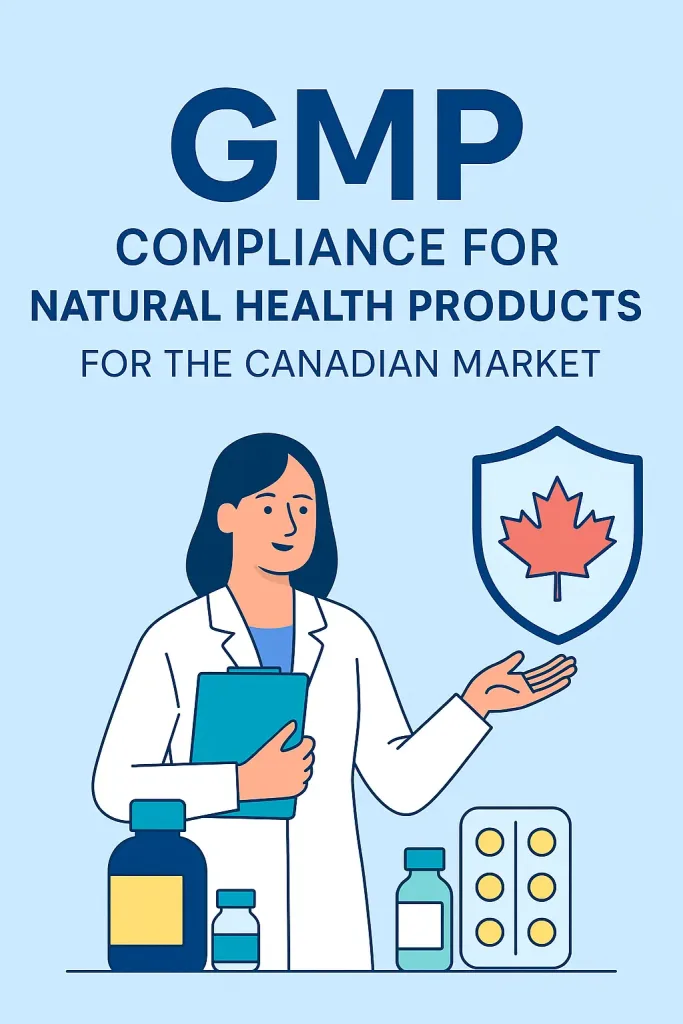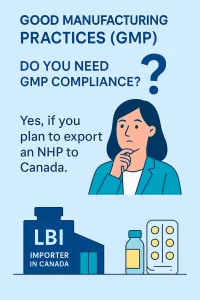Health Canada's GMP Rules Explained:
A Simple Guide for Latin American Exporters
of Natural Health Products
If you manufacture or export natural health products (NHPs) in a Latin American country and are interested in selling them in Canada, you must follow special rules. These rules are called Good Manufacturing Practices (GMP), and they are required by Health Canada—Canada’s national health authority. These rules are very strict and may be different from what you’re used to in your country.
This article explains these rules in simple language. We will show you what Health Canada expects, who needs to follow these rules, and how to avoid mistakes that could stop your product at the Canadian border. Most importantly, we will help you understand what you need to do right now if you want to register and sell your NHP in Canada.
This guide is written for English-as-a-second-language (ESL) professionals and first-time exporters to Canada.
The Integrative Consulting Group (ICG), helps exporters just like you.
We speak Spanish and English, and we are based in Canada.
We specialize in helping Latin American brands register their natural health products with Health Canada.
What you need to know to import your NHP into Canada:
- What is GMP and Why Does It Matter?
- Who Must Follow Health Canada’s GMP Rules?
- Understanding the Canadian GMP System: 4 Pillars
- Examples of GMP Rules You Must Follow
- Special Requirements for Latin American Exporters
- Changes Coming in 2026: What You Need to Prepare For
- Common Mistakes That Can Delay or Reject Your Application
- How ICG Helps Latin American Exporters Succeed
- Start Your Canadian Export Journey Today
What is GMP and Why Does It Matter?
GMP stands for Good Manufacturing Practices. In Canada, it is a legal requirement for all natural health products. If you want to export your vitamins, herbal remedies, homeopathic products, or dietary supplements to Canada, your product must be made in a facility that follows these GMP rules.
Health Canada uses GMP to protect people. They want to make sure every product sold in Canada is made in a clean, well-organized, and well-documented way. If your company cannot prove that your manufacturing site follows GMP, Health Canada will not allow your product to be sold.
Even if your product is high quality, Health Canada must see the proof in your documents. That is why understanding and following GMP is essential for getting a Site Licence or product registration in Canada.
Who Must Follow Health Canada’s GMP Rules?
Several types of businesses must follow GMP rules:
- Manufacturers: If your company produces the product in your home country
- Packagers & Labellers: If your company bottles, fills, seals, or labels the product
- Importers: The Canadian company that imports your product (they are legally responsible)
If you want to export your product to Canada, you will work with a Canadian importer. That importer must show that your manufacturing process meets Canadian GMP standards. So even if you are not in Canada, your company must follow GMP rules.
Understanding the Canadian GMP System: 4 Pillars
Health Canada explains GMP using 4 simple categories. Think of these as the 4 things you need to control to show that your product is safe and reliable:
- Places: Is your factory clean, organized, and separate from food or chemicals?
- People: Are your workers trained? Do you have a person responsible for quality?
- Processes: Do you have written procedures for manufacturing, cleaning, testing, and shipping?
- Products: Can you prove what ingredients are used? Can you trace each batch?
If you can show Health Canada that these 4 areas are under control, you are on the right path.
Examples of GMP Rules You Must Follow
Here are some examples of what Health Canada expects to see:
- Your factory must have separate areas for raw materials, finished products, and waste
- You must test each batch to confirm it matches your label
- All actions must be written in Standard Operating Procedures (SOPs)
- You must assign a Quality Assurance Person (QAP) who checks and signs off on everything
- You must keep documents for every lot you make, and keep them for 1 year after expiry
- If you make sterile or ophthalmic products, your cleaning and air quality must be proven
These are not suggestions—they are legal requirements. A Canadian importer cannot register your product unless these rules are followed and proven with documentation.
Special Requirements for Latin American Exporters
Many Latin American companies think they can just send product samples to a Canadian partner and register the product. But the process is much more complex.
Your Canadian partner must get a Site Licence or demonstrate that your site meets GMP. That means you must:
- Give the importer a copy of your Certificate of Analysis (CoA) for each batch
- Send your Master Production Documents showing your formulation and process
- Allow your importer to audit your factory, or hire a consultant (like ICG) to do it
If these steps are not taken, Health Canada will reject the application—and you will waste time and money.
Changes Coming in 2026: What You Need to Prepare For
Health Canada has already announced changes coming in March 2026. These changes will require more documentation and clear proof of CAPA (Corrective and Preventive Actions). This is a system where you fix problems and document how they will never happen again.
For exporters, this means you need to improve your SOPs and quality systems now—before the new rules are enforced.
Common Mistakes That Can Delay or Reject Your Application
Based on our work with dozens of LATAM exporters, here are the most common errors:
- Using a factory that is GMP-certified locally but not compliant with Canadian GMP
- Missing documents such as SOPs, CoAs, or quality release records
- Incorrect labelling—missing NPN numbers or using medical claims
- No QAP assigned—no one to review or approve each batch
These are avoidable mistakes if you work with a Canadian consultant who understands both your local culture and Canada’s expectations.
How ICG Helps Latin American Exporters Succeed
Integrative Consulting Group (ICG) helps Latin American companies register and sell natural health products in Canada. We speak your language—literally and professionally. Our bilingual consultants help you:
- Understand Canadian regulations in Spanish and English
- Prepare your GMP documents and SOPs
- Pass mock audits and site licence evaluations
- Find reliable Canadian importers
- Fix problems quickly with CAPA plans
We work with you step by step—from first contact to final registration.
Start Your Canadian Export Journey Today
Don’t lose your chance to sell your products in Canada. With the right partner, GMP compliance is possible—even from Latin America.
📅 Book a Free Consultation in Spanish or English
This article is for educational purposes only. For regulatory advice, contact Integrative Consulting Group directly.


